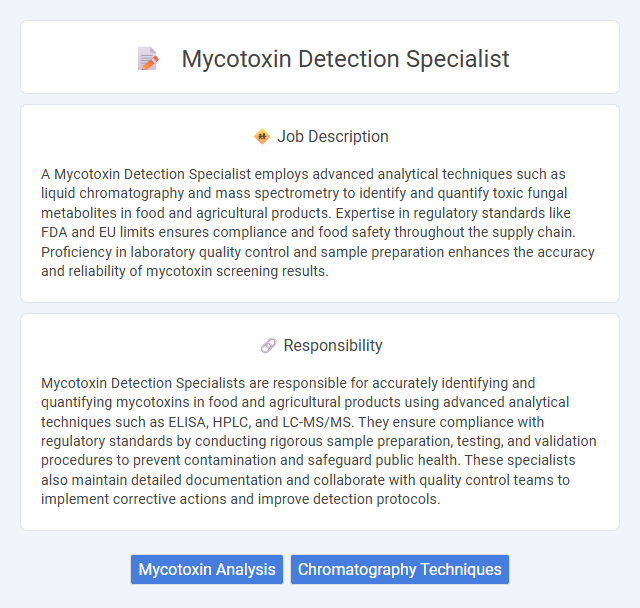
A Mycotoxin Detection Specialist employs advanced analytical techniques such as liquid chromatography and mass spectrometry to identify and quantify toxic fungal metabolites in food and agricultural products. Expertise in regulatory standards like FDA and EU limits ensures compliance and food safety throughout the supply chain. Proficiency in laboratory quality control and sample preparation enhances the accuracy and reliability of mycotoxin screening results.
Individuals with strong analytical skills and attention to detail are likely to excel as Mycotoxin Detection Specialists, as the role involves precise laboratory testing and data interpretation. Those who thrive in controlled environments and have a background in microbiology, chemistry, or food safety may find themselves well-suited for this career. Candidates who prefer routine work with a focus on quality control and regulatory compliance might have a higher probability of success in this position.
Qualification
A Mycotoxin Detection Specialist must possess a strong background in microbiology, biochemistry, or food science, often supported by at least a bachelor's degree in a relevant field. Proficiency in advanced analytical techniques such as ELISA, HPLC, and mass spectrometry is crucial for accurate identification and quantification of mycotoxins. Experience with laboratory safety protocols, quality control standards, and data analysis software enhances the specialist's ability to ensure comprehensive and reliable toxin detection in various food and agricultural products.
Responsibility
Mycotoxin Detection Specialists are responsible for accurately identifying and quantifying mycotoxins in food and agricultural products using advanced analytical techniques such as ELISA, HPLC, and LC-MS/MS. They ensure compliance with regulatory standards by conducting rigorous sample preparation, testing, and validation procedures to prevent contamination and safeguard public health. These specialists also maintain detailed documentation and collaborate with quality control teams to implement corrective actions and improve detection protocols.
Benefit
Working as a Mycotoxin Detection Specialist likely offers specialized expertise in food safety and quality control, increasing job security in agriculture and food industries. This role probably provides opportunities to work with advanced detection technologies and contribute to public health by ensuring products are toxin-free. Professionals in this field might benefit from competitive salaries and prospects for career advancement due to increasing awareness of mycotoxin risks.
Challenge
Mycotoxin Detection Specialists likely face the ongoing challenge of accurately identifying trace levels of harmful toxins in diverse food and feed samples, which may require precise analytical techniques. The complexity of sample matrices and the presence of multiple mycotoxins can potentially complicate detection, increasing the probability of false positives or negatives. Keeping up with rapidly evolving detection technologies and regulatory standards probably demands continual learning and adaptation in this field.
Career Advancement
A Mycotoxin Detection Specialist leverages advanced analytical techniques such as HPLC and ELISA to identify and quantify mycotoxins in food and agricultural products, ensuring safety and regulatory compliance. Gaining expertise in emerging detection technologies and regulatory standards opens pathways to senior roles like Laboratory Manager or Quality Assurance Director. Continuous professional development and cross-disciplinary knowledge in toxicology and food safety can accelerate career progression within the agri-food sector.
Key Terms
Mycotoxin Analysis
Mycotoxin Detection Specialists utilize advanced analytical techniques such as chromatography and mass spectrometry to accurately identify and quantify mycotoxin compounds in agricultural products and food samples. Proficiency in sample preparation, method validation, and compliance with regulatory standards like FDA and EFSA ensures reliable mycotoxin analysis for food safety and quality control. Expertise in interpreting chromatographic data and managing laboratory instrumentation is crucial for detecting contaminants such as aflatoxins, ochratoxin A, and fumonisins in complex matrices.
Chromatography Techniques
A Mycotoxin Detection Specialist employs advanced chromatography techniques such as High-Performance Liquid Chromatography (HPLC) and Gas Chromatography (GC) to accurately identify and quantify toxic fungal metabolites in food and feed samples. Expertise in method development, sample preparation, and validation ensures reliable detection aligned with regulatory standards like FDA and EU guidelines. Proficiency in integrating chromatography with mass spectrometry (LC-MS/MS, GC-MS) enhances sensitivity and specificity for comprehensive mycotoxin profiling.
 kuljobs.com
kuljobs.com